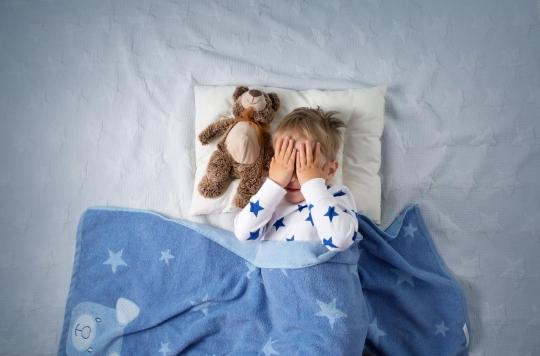While good sleep is essential to children’s well-being and development, too many French children don’t get enough sleep.

- Sleep needs change over the years from 14 to 17 hours a day in infants under 3 months to 8 to 10 hours in adolescents.
- The child’s sleep maturation is gradual.
According to a new survey by the Institute of Sleep and Vigilance and some MGEN55% of children spend more than an hour on screen after 5 p.m. on weekdays, which is accompanied by more fatigue in the morning when they wake up. In 11% of cases, the child falls asleep with a screen on in the bedroom. His falling asleep time is then increased by 18 minutes on average (48 min. against 30 min.).
Exposure to screens
“This exposure to screens is all the more worrying today because the younger the child, the more it is necessary to keep them away from screens – which are sources of stress, quarrels, traumatic images and words – in order to preserve their sleep”, comments the Institute.
Moreover, 52% of children and 45% of children under 3 have irregular hours and insufficient sleep durations, which is contrary to all pediatric recommendations. However, parents are rather aware of the impact of lack of sleep in children, primarily on attention (65%), on learning (50%), on the difficulty of controlling their emotions (48%) and outbursts of anger (44%).
A major determinant
“Essential to child development, sleep is a major determinant of mental and physical well-being, at all ages,” complements the Sleep and Vigilance Institute. “For this reason, parents should try to preserve it, in themselves and in their child. When you have poor quality sleep during childhood, the risk of persistence of this disorder in adolescence and adult is high, which is to say the importance of the parental function”, adds Professor Patricia Franco, pediatrician and researcher, head of the Sleep Unit at the Woman-Mother-Child Hospital in Lyon.
Last lesson of this new survey: parents more frequently have a sleep disorder when their child has one, and vice versa. “Scientific studies have shown the need for a transactional model to properly study children’s sleep: the quality and quantity of children’s sleep depend globally on the behavior of the people who take care of them, first and foremost the parents, with their physical, psychic and socio-cultural singularities”, concludes Dr. Marie-Françoise Vecchierini, neuro-psychiatrist and member of the scientific council of INSV.

.

















